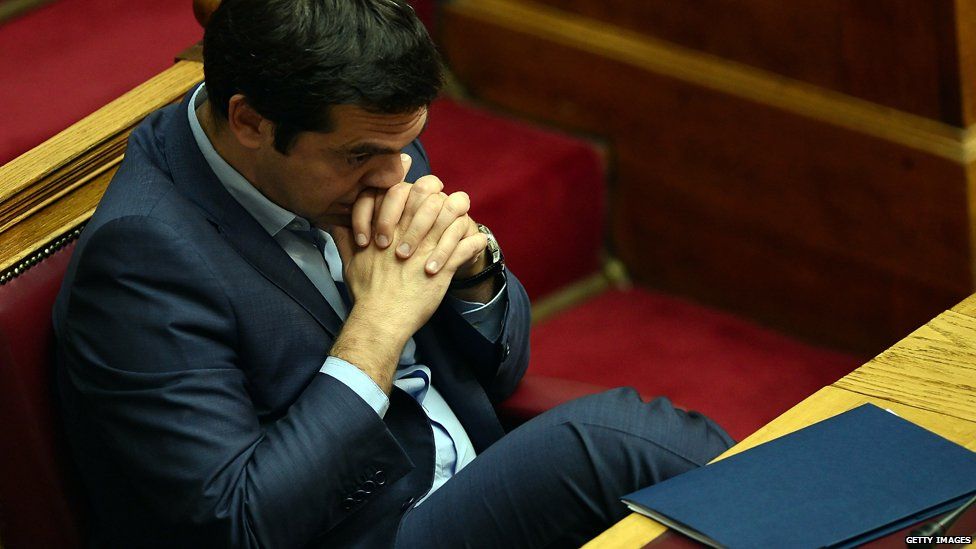Third time lucky for Greece?
- Published
- comments

After months of delay and crisis, Greece has finally agreed a third bailout deal (well almost) - providing up to 86bn euros of new credit.
According to Ministry of Finance sources in Athens, there are still some minor details to be sorted out. We should see a more detailed statement in an hour or two.
And the package will have to be agreed by the Greek and German parliaments, and eurozone finance ministers, in coming days.
But this should be rescue number three for the eurozone economy, which since 2009 has more than any other shown up the flaws in the structure of the currency union.
It is nonetheless hugely significant for Greece's future in the euro that its creditors - the International Monetary Fund, the European Central Bank and the other eurozone governments - appear to be satisfied with a programme of austerity and economic reform agreed by Athens (and see what I wrote on this yesterday).
Although the Syriza government of Alexis Tsipras may be criticised by some of its supporters for agreeing to austerity that it originally rejected, he will point out that this year Athens is being permitted to run a deficit - yet again.
The newly agreed fiscal targets are a deficit of 0.25% for this year, a surplus of .5% in 2016, +1.75% in 2017 and +3.5% in 2018.
There are few things to say about these fiscal targets.
First, although Mr Tsipras will present the 0.25% deficit for this year as an easing of austerity and a political success, many will by contrast see it as simply a reflection of Greece's economic failure in recent months, the return to probable recession caused by the closure of the banks last month.
Which is why rehabilitating the banks, and easing restrictions on withdrawals and lending, is right now the sine qua non of a sustainable recovery in Greece.
And that in turn will take months of painful negotiation on recapitalising the banks - with perhaps 25bn euros of eurozone taxpayers' money - to provide proof to the people of Greece that their savings can be returned to banks from under the mattress.
Second there will be few economists who believe that Greece will succeed in generating a surplus of 3.5% in 2018 and then sustaining that surplus for years - partly because it is rare for any Western economy to stay on a path of spending less than tax revenues for any length of time, let alone an economy with a private sector as feeble as Greece's.
Third, and I am sorry to say you will have heard this a few times from me, the really hard negotiations start soon - on how to reduce Greece's massive debts, set to peak at close to 200% of GDP or national income in the next two years (according to the IMF) to an affordable level.
Without debt write-offs, prosperity will never return to Greece, and its future in the euro will never be assured.
With debt write-offs, populist parties throughout the eurozone will be able to claim to voters that they have nothing to fear and everything to gain from throwing out the mainstream establishment parties and re-asserting national sovereign rights to economic self-determination.
Or to put it another way, euro politics and euro economics of Greek debt forgiveness point in diametrically opposed directions.
Which is why no-one should see today's important bailout agreement for Greece as a permanent happy ending.